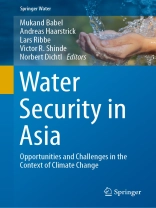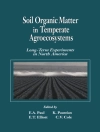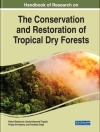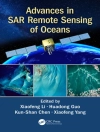This book assesses the current water-security situation in Asia. The thematic areas of the book discuss the United Nation’s sustainable development goals with a particular focus on Goal 6 (“Ensure availability and sustainable management of water and sanitation”) and Goal 13 (“Take urgent action to combat climate change and its impacts”). Asia has been facing a number of water-related challenges for decades due to multiple factors such as increasing population, socio-economic development, urbanization and migration, and climate change now poses an additional threat. While significant efforts have been made by governments in Asia, much more work is needed to make Asian societies water-secure.
Given its multi-disciplinary approach, the book is a valuable resource for researchers involved in the further development of water-security concepts, approaches, and methodologies. In addition, it helps policymakers, planners, and practitioners to formulate sustainable water- security enhancement strategies grounded in sound scientific evidence to protect human well-being.
Inhaltsverzeichnis
Water, food security and Asian transition: A new perspective within the face of climate change.- Consolidating Drought Projections – Eastern Australia.- Planning for Climate Change and Mechanisms for Co-Operation in Southeast Asia’s Sesan, Sekong and Srepok Transboundary River Basin.- Environmental Security Issues No Longer of Secondary Importance for Regional Cooperation or Conflict: The Case of the Mekong River.- Emerging Research Needs for Water Security Enhancement.- The Threats to Urban Water Security of Indonesian Cities.- River Basin Planning for Water Security in Sri Lanka.- Water Quality Index: A Tool for Wetland Restoration.- A Framework for Implementing Integrated Water Resources Management at River Basin Level in Indonesia.- Addressing Water Security Issue: Prioritizing Reconstruction of Safe Drinking Water Schemes in 2015 Earthquake Affected Districts of Nepal.- A Study in Developing of Theoretical Framework of Urban Water Security in Indonesia.- Micro Level Vulnerability Assessment of Estuarine Islands: A Case Study from Indian Sundarban.- Assessing Water Security at District Level: A Case Study of Bangkok, Thailand.- Assessment of Water Security in Indonesia Considering Future Trends in Land Use Change, and Climate Change.-Application of Hydrological Study Methodologies Used in African Context for Water Security in Asian countries.-Implementation of Budyko Curves in Assessing Impacts of Climate Changes and Human Activities on Streamflow in the Upper Catchments of Dong Nai River Basin.- Contribution of Snow and Glacier in Hydropower Potential and its Response to Climate Change.












